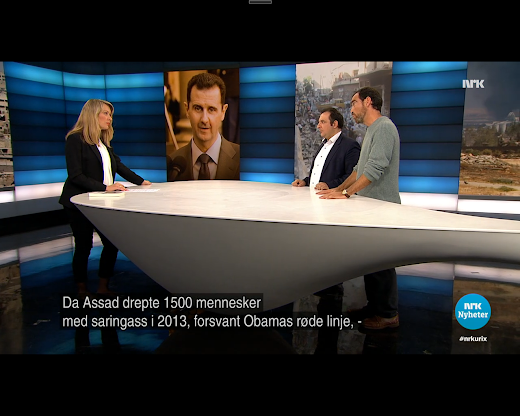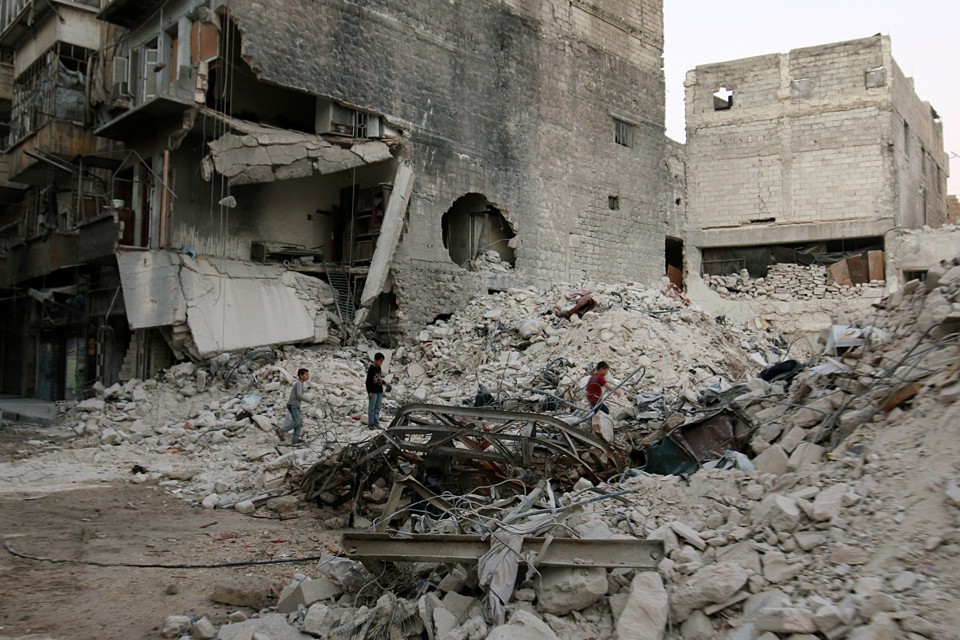
Robin Yassin-Kassab:
"I don't think there is a play between the superpowers. I don't think there is a battle between Russia and America. On the ground in Syria, the perception is that they are more or less on the same side. America wants Bashar al-Assad to go, but the régime to stay in place. Russia wants Bashar al-Assad to stay as well, and they're trying very hard to work together. When Assad killed 1500 people with sarin gas in 2013, Obama's red line disappeared, and he very publicly handed the Syria file to Russia. He's just done a deal with Iran over the nuclear issue, which is a good thing, but precisely at the moment when Iran has got tens of thousands of occupation troops, including Shia jihadists, in Syria. He's not talking about that. So the Syrians think Russia and America are, more or less, on the same side, the whole world is betraying them."
Mazen Darwish:
"This is our life for more than four years. This is daily Syrian life in many places. And they ask why are there all these refugees, why do people become extreme and turn to terrorism? This is the result."
Robin Yassin-Kassab:
"We have to remember that as well as the horrors of war, and the extremists, the jihadists, the fascist régime, the foreign occupation, there is also remarkable stuff happening in Syria, in the revolutionary areas, which nobody talks about, which is part of the solution. There are over 400 local councils in Syria, many of them democratically elected; and these are the people who are representative Syrians, they are keeping life together in the most difficult of circumstances. That's what's under threat in Aleppo. Aleppo is the biggest concentration of civil society activists and groups, education services, the White Helmets, everybody else, in the country. If they manage to destroy that in Syria, then in a year or two we will be facing just jihadism."
Mazen Darwish:
"Nobody can win in the end through military means. We are talking about 300,000 civilians in this area. If they want to kill all of them, this is the only way to have a victory."
Robin Yassin-Kassab:
"I must dispute that the Syrian government forces are trying to invade eastern Aleppo. It's not really the Syrian government forces. The Syrian Army is more or less finished. It hasn't won a battle by itself since 2012. It's Russian bombs, Iranian and international Shia jihadist ground troops. It's a foreign occupation as much as it's a civil war at this point."
Mazen Darwish:
"From the beginning, the régime pushed for this solution -for the extremism. While we were arrested, the human rights defenders and civil society leaders, Assad released more than a thousand jihadists from al-Qaeda from prison. So from the beginning they have had this strategy, to push the country towards violence. And because they get support, not just from Russia and Iran, but from the West in general. They see what happens in Syria, and they don't care, or don't think we will reach this level. Only now after the refugee crisis has Syria become important, but what has happened is systematic, and this is the result."
Robin Yassin-Kassab:
"The revolution survives, remarkably, despite the fact that the régime has made it into a war, and done everything it can to bring extremists into the country so that the West will be scared of the alternative. Nevertheless, there are hundreds of democratically elected councils, there are tens of Free radio stations, Free newspapers, Free TV stations, women's centres."
Mazen Darwish:
"Each time you have a ceasefire, like you had in February, thousands of people come out in civil protests again. Singing and dancing, asking for the same goals - freedom and dignity."

